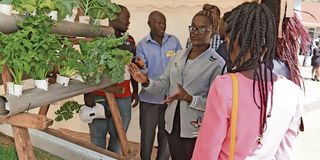Here is how to create the next agriprenuers

Youth are taken through a hydroponics farming lesson during a youth agriculture summit in Embu. Youth must be brought on board the agriculture bandwagon and the best way of doing this is through a concept known as “agribusiness incubation”. PHOTO | FILE | NATION MEDIA GROUP
What you need to know:
- Agriculture is a science and an art and it requires energy, enthusiasm and expertise.
- More youth must be brought on board and the best way of doing this is through a concept known as “agribusiness incubation”.
- The idea is not new in Kenya and there are public and private incubation centres but few people are aware of it.
The rising population requires that more young and energetic people take up farming to feed it. However, the average age of farmers in Kenya ranges from 40 to 60.
One contributing factor is the long-held perception that one can engage in farming with minimal knowledge, skills and passion.
But agriculture is a science and an art and it requires energy, enthusiasm and expertise.
Therefore, more youth must be brought on board and the best way of doing this is through a concept known as “agribusiness incubation”.
The idea is not new in Kenya and there are public and private incubation centres but few people are aware of it. So, how does the concept works?
Business incubation
This involves helping new and start-up entities grow by offering them management training, office space as well as capital where possible.
A good example of an incubation organisation is the Kenya Industrial Research and Development Institute (Kirdi), which supports value addition-based enterprises in developing, assimilating, absorbing and utilising technology to hasten their development.
Other institutions offering agribusiness incubation include University of Eldoret, Pwani University, National Aquaculture Development Centre in Kirinyaga County, the Kenya School of Agriculture in Nyeri County and Kisii University.
The incubator can range from a small farmer to a large processing unit or it can also be an organisation that intends to transform research findings into socio-economic development tools.
Incubation at the farm level
Individual farmers can develop their own incubation procedures and start with their household members or other interested parties by letting them own a portion of the farm enterprise such as a few layer birds or one dairy animal.
The incubatee should participate in the day-to-day activities of the farm with or without remuneration but should get all the proceeds from his share of animals.
As the share grows, the incubator should mentor the incubatee on how to get independent even if it is in the same compound and mentorship should continue until the business of the incubatee can stand on its own.
Incubation at the industrial level
An industry needs to develop a policy on the incubation model of its choice and set aside resources that include infrastructure, personnel and capital to make it a success.
One successful incubator in the country normally sends out invitations to interested incubatees and then selects the best, who thereafter work with facilitators, mentors and likeminded entrepreneurs in the same environment for four months.
The sessions are designed to assist the incubatees analyse the real needs for input and feedback from the market, customers and key stakeholders and design their tests and pilots accordingly.
After a month, the teams present their plans for piloting and testing to a panel of business experts and fellow peers.
The panel picks the promising ideas to receive a pre-committed funding to commence the testing and piloting.
Successful teams continue with the programme for a few more weeks, executing their ideas with guidance of facilitators, mentors and advisers.
The activities conclude with a presentation to potential investors, key stakeholders and other interested parties on what their pilots revealed and way forward.
The incubator industry does not have to be an agro company, a geothermal plant that is based in an agricultural zone can be an incubator but employ experts to do the programme.
The incubator can even be a learning institution or a church that carries out incubation during the holidays.
Incubation at research organisations
One of the challenges of research is development of intellectual rights, which has seen innovations going to waste due to registration bureaucracy.
Research institutions can incubate their products to commercial level. A good example is a researcher who develops a new way of connecting biogas pipes, which could lead to exponential adoption of the gas in rural areas where there is no electricity.
The writer is a livestock expert [email protected]





